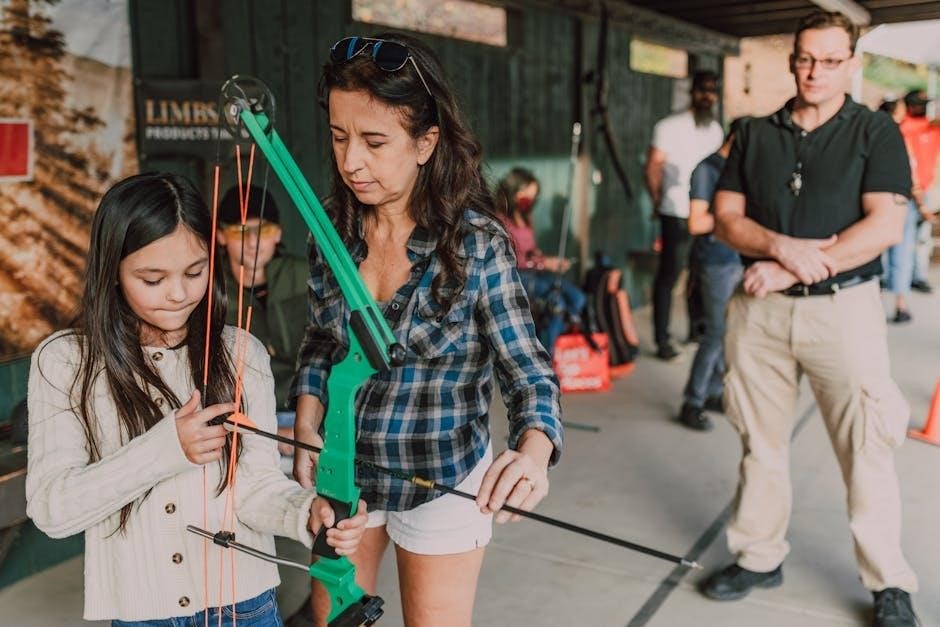instructional coaching cycle
The Instructional Coaching Cycle is a collaborative process between coaches and educators‚ focusing on improving teaching practices and student outcomes through structured planning‚ observation‚ and reflective feedback.
Definition and Purpose of Instructional Coaching
Instructional coaching is a partnership-based professional development strategy where coaches work with educators to enhance teaching practices‚ student learning‚ and school outcomes. Its primary purpose is to foster a collaborative environment focused on continuous improvement. Coaches provide support through structured planning‚ observation‚ and feedback‚ helping teachers refine their instructional strategies. The goal is to bridge the gap between theory and practice‚ ensuring teachers feel supported while developing skills that directly impact student success. This approach emphasizes data-driven decisions‚ reflective conversations‚ and tailored interventions to meet individual teacher needs.
Key Components of the Coaching Cycle
The instructional coaching cycle consists of several interconnected components‚ including planning and goal setting‚ classroom observations‚ data collection‚ reflection‚ feedback‚ implementation‚ and evaluation. Coaches and teachers collaborate to identify instructional priorities‚ develop action plans‚ and monitor progress. Observation and data collection provide insights to inform teaching strategies. Reflection and feedback loops ensure continuous improvement‚ while implementation and evaluation assess the impact of the cycle. These components work together to create a structured‚ iterative process aimed at enhancing teacher effectiveness and student achievement.

Planning and Goal Setting
Planning and goal setting are foundational steps in the instructional coaching cycle‚ involving collaboration between coaches and teachers to establish clear‚ measurable objectives aligned with student outcomes.
Identifying Instructional Goals with Teachers
Identifying instructional goals involves collaborative discussions between coaches and teachers to define specific‚ measurable objectives aligned with student outcomes and school priorities. Coaches help teachers analyze classroom data and identify areas for improvement. By understanding teacher strengths and challenges‚ coaches facilitate the creation of realistic and impactful goals. These goals are often tied to enhancing teaching strategies‚ improving student engagement‚ and addressing learning gaps. Regular assessments and adjustments ensure goals remain relevant and achievable‚ fostering a focused approach to instructional growth.
Developing a Collaborative Action Plan
Developing a collaborative action plan involves coaches and teachers working together to outline specific steps for achieving instructional goals. This plan includes actionable strategies‚ timelines‚ and responsibilities‚ ensuring alignment with classroom needs and school objectives. Coaches provide resources and support‚ while teachers share insights into their classroom context. The plan is flexible‚ allowing for adjustments based on progress and feedback. This collaborative approach fosters ownership and accountability‚ creating a clear roadmap for professional development and improved student outcomes.

Observation and Data Collection
Observation and data collection involve systematically gathering information on teaching strategies‚ student engagement‚ and classroom environment to inform coaching decisions and support teacher growth.
Effective Strategies for Classroom Observations
Effective classroom observations involve a structured approach‚ including pre-observation planning‚ focused note-taking‚ and non-intrusive methods to avoid disrupting the learning environment. Coaches should use checklists or observation protocols to guide their focus‚ such as monitoring student engagement‚ teacher questioning techniques‚ and instructional strategies. Observing specific‚ agreed-upon goals ensures relevance and alignment with teacher needs. Coaches should also practice active listening and maintain objectivity to provide unbiased feedback. Post-observation‚ coaches analyze data to identify patterns and areas for growth‚ ensuring observations are purposeful and directly inform instructional decisions.
Using Data to Inform Instructional Decisions
Using data to inform instructional decisions is a cornerstone of the coaching cycle. Coaches collect and analyze data from observations‚ student performance metrics‚ and teacher feedback to identify trends and areas for improvement. This data is then used to refine teaching strategies‚ adjust lesson plans‚ and target professional development. By leveraging actionable insights‚ coaches and teachers can make informed decisions that directly impact student learning outcomes. Regular data review ensures that coaching efforts remain focused‚ relevant‚ and aligned with instructional goals‚ fostering continuous improvement in the classroom.
Reflection and Feedback
Reflection and feedback are essential for teacher growth and student success. Coaches facilitate reflective conversations‚ helping teachers analyze practices‚ identify strengths‚ and areas for improvement‚ fostering professional development and instructional refinement through constructive dialogue and actionable insights.
Facilitating Reflective Conversations with Teachers
Facilitating reflective conversations is a cornerstone of instructional coaching. Coaches create a safe‚ non-judgmental space for teachers to explore their practices‚ challenges‚ and successes; By asking open-ended questions and actively listening‚ coaches help teachers deepen their understanding of instructional strategies and student needs. This collaborative dialogue encourages teachers to identify strengths‚ areas for growth‚ and actionable steps for improvement. Reflective conversations not only foster professional development but also empower teachers to take ownership of their learning and instructional decisions‚ leading to enhanced student outcomes and classroom effectiveness.
Providing Actionable Feedback for Growth
Providing actionable feedback is essential for fostering teacher growth within the instructional coaching cycle. Coaches offer specific‚ timely‚ and constructive insights that highlight strengths and areas for improvement. Feedback is grounded in classroom observations‚ student data‚ and collaborative goals. By focusing on measurable actions and providing practical suggestions‚ coaches empower teachers to refine their practices. This supportive process encourages reflection‚ experimentation‚ and sustained professional development‚ ultimately enhancing teaching effectiveness and student learning outcomes through targeted‚ growth-oriented dialogue and collaboration.

Implementation and Professional Development
Implementation involves supporting teachers in applying new strategies‚ while professional development provides targeted learning opportunities to enhance instructional skills and foster continuous improvement in teaching practices.
Supporting Teachers in Applying New Strategies
Instructional coaches play a vital role in helping teachers implement new teaching methods by providing hands-on support‚ modeling techniques‚ and co-planning lessons. Coaches offer resources‚ feedback‚ and guidance to ensure teachers feel confident and prepared. This collaborative approach allows educators to refine their skills and adapt strategies to meet student needs effectively. By fostering a growth mindset‚ coaches empower teachers to experiment with innovative practices while maintaining a focus on student outcomes and instructional improvement. This partnership ensures sustainable growth and enhances the overall quality of teaching practices.
Designing Professional Learning Opportunities
Instructional coaches design professional learning opportunities to help teachers enhance their skills and implement effective strategies. These opportunities include workshops‚ peer discussions‚ and modeling techniques. Coaches ensure activities are aligned with instructional goals and teacher needs‚ fostering active participation and engagement. By providing structured yet flexible learning experiences‚ coaches enable teachers to explore innovative practices and apply them confidently in the classroom. This collaborative approach ensures that professional development is relevant‚ impactful‚ and tailored to support continuous improvement in teaching and student learning outcomes.

Evaluation and Impact
Evaluation assesses the coaching cycle’s effectiveness‚ measuring progress toward goals and identifying areas for improvement. Data and feedback inform future coaching strategies‚ ensuring meaningful impact on teaching and learning outcomes.
Assessing the Effectiveness of the Coaching Cycle
Assessing the coaching cycle’s effectiveness involves evaluating its impact on teaching practices and student outcomes. Data collection‚ classroom observations‚ and teacher feedback are key tools for measuring progress. Coaches analyze whether goals were met and identify areas for improvement. This process ensures the cycle’s adaptability and relevance‚ fostering continuous growth. Regular assessment also helps in refining strategies and scaling successful practices. By focusing on measurable outcomes‚ the coaching cycle’s effectiveness is validated‚ ensuring it remains a valuable tool for educational improvement. This step is crucial for sustaining long-term impact and teacher development.
Scaling Successful Practices Across the Organization
Scaling successful coaching practices involves sharing effective strategies across the organization. Coaches identify proven methods and collaborate with leadership to implement them district-wide. Professional learning opportunities‚ peer coaching‚ and technology tools facilitate widespread adoption. Data-driven approaches ensure scalability and consistency. By fostering a culture of shared knowledge‚ organizations can maximize the coaching cycle’s impact‚ leading to systemic improvements in teaching and learning. This collaborative approach ensures that successful practices benefit all educators‚ promoting equitable educational growth and sustained success.
The instructional coaching cycle concludes with a reflection on its impact‚ emphasizing the coach’s role in fostering educational growth and the potential for future advancements in teaching practices.
The Role of Instructional Coaches in Educational Improvement
Instructional coaches play a vital role in educational improvement by empowering teachers with strategies‚ resources‚ and support to enhance teaching practices and student learning outcomes. They facilitate collaborative planning‚ observe classrooms‚ and provide actionable feedback‚ fostering a culture of continuous improvement. Coaches also help teachers analyze data to inform instruction and implement evidence-based practices. By building teacher capacity and promoting professional growth‚ instructional coaches contribute significantly to achieving school-wide goals and improving educational quality. Their work is essential for creating sustainable‚ impactful changes in education.
Future Directions for Instructional Coaching
Future directions for instructional coaching emphasize leveraging technology‚ data-driven practices‚ and personalized learning strategies to enhance teacher development. Coaches will increasingly use AI and machine learning tools to analyze classroom data and tailor support. There will also be a focus on scaling successful practices across districts and integrating coaching into broader school improvement initiatives. Additionally‚ coaches will prioritize teacher well-being and equity‚ ensuring all educators have access to resources that foster inclusive and culturally responsive teaching. These advancements aim to create a more sustainable and impactful coaching cycle for modern education.

